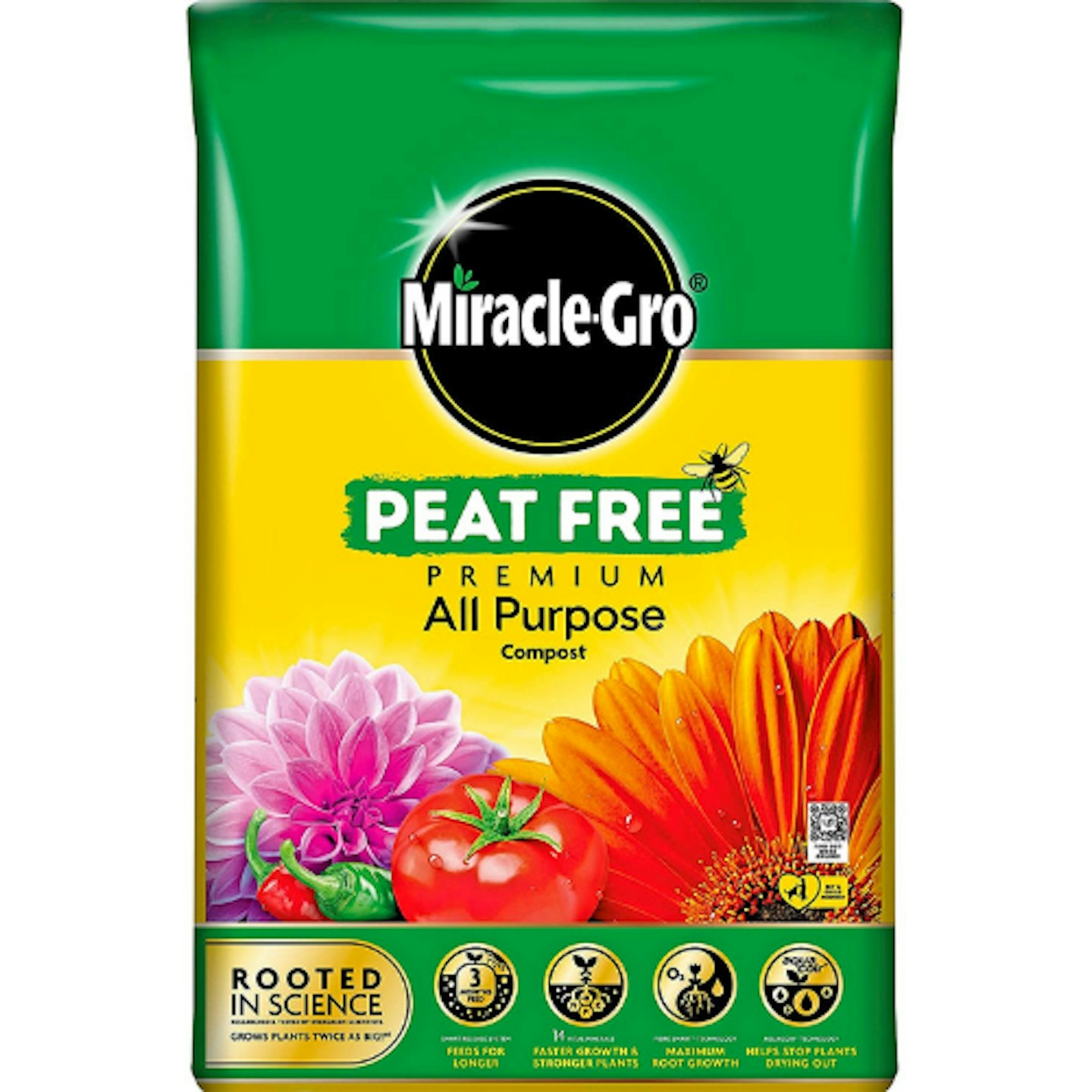Your outdoor garden plants can greatly benefit from some peat-free compost. Sales of bagged peat-free compost are set to soar this year, as more and more of us choose to shop for eco-friendly garden products to make our plots more planet-friendly. Peat has long been used to make compost, the dark and crumbly material providing moisture and goodness to legions of British gardens.
Peat covers around three per cent of the world’s surface, amassing steadily at a rate of around 1 to 2mm a year as plant matter slowly decays. It’s been used for centuries to grow crops and as fuel but the problem is that, when the peat beds are disturbed, they release dangerous amounts of carbon dioxide into the atmosphere, contributing significantly to climate change.
Best peat-free compost at a glance:
• Best with seaweed: RHS SylvaGrow Organic Growing Medium - View on Suttons
• Best for longevity: Miracle-Gro Peat-Free Premium All Purpose Compost - View on Amazon UK
• Best for root growth: Westland New Horizon All Plant Compost - View on Amazon UK
The peatlands are also rich with life, supporting a rare and diverse mix of plants and wildlife. And there’s also the environmental cost of transport to consider since Ireland, once the main source of peat, banned its extraction, and imports now come mainly from the Baltic region.
So, as the world wakes up to the environmental impact of harvesting it, we’re learning to live without it. With the UK government due to ban the sale of peat in mid-2024, manufacturers have spent plenty of time and money coming up with good alternatives, experimenting with more sustainable materials, and mixing them for optimum results.
So there are all sorts of new products on the market, which is fantastic, but also rather baffling to negotiate! But don’t worry, we’re here to help...
Best peat-free composts
Best with seaweed
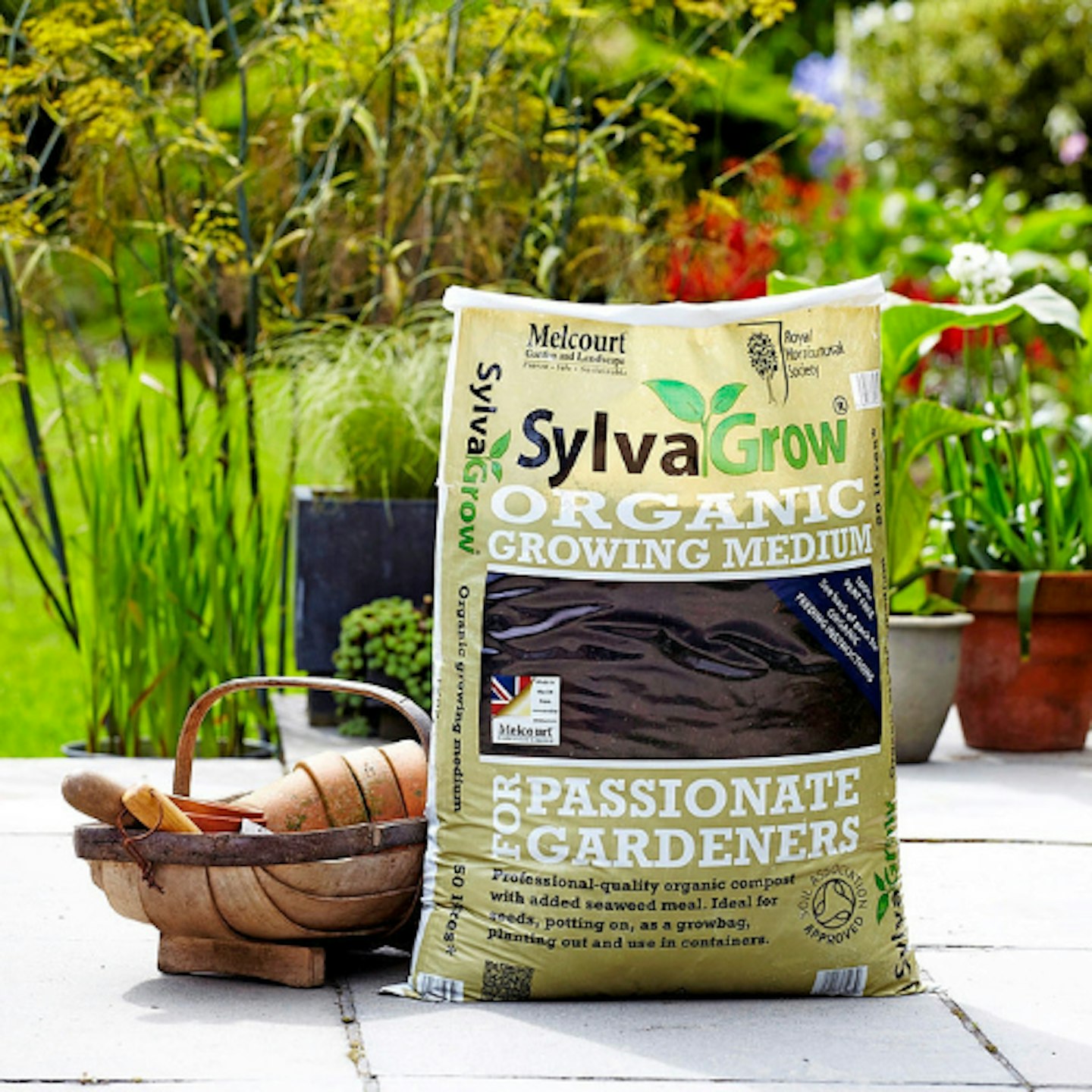 RHS/Sutton Seeds
RHS/Sutton Seedswww.suttons.co.uk
RHS SylvaGrow Organic Growing Medium contains seaweed for a nutrient boost and a unique blend of fine bark, green compost, and coir, all sustainably sourced. The seaweed meal and organic fertilisers also help with disease resistance, always welcome for our gardens! In addition, this is Soil Association Approved, so it can be used in gardens and allotments classed as organic.
Pros
- RHS-endorsed
- Contains seaweed
Cons
- Not next day delivery
Best for root growth
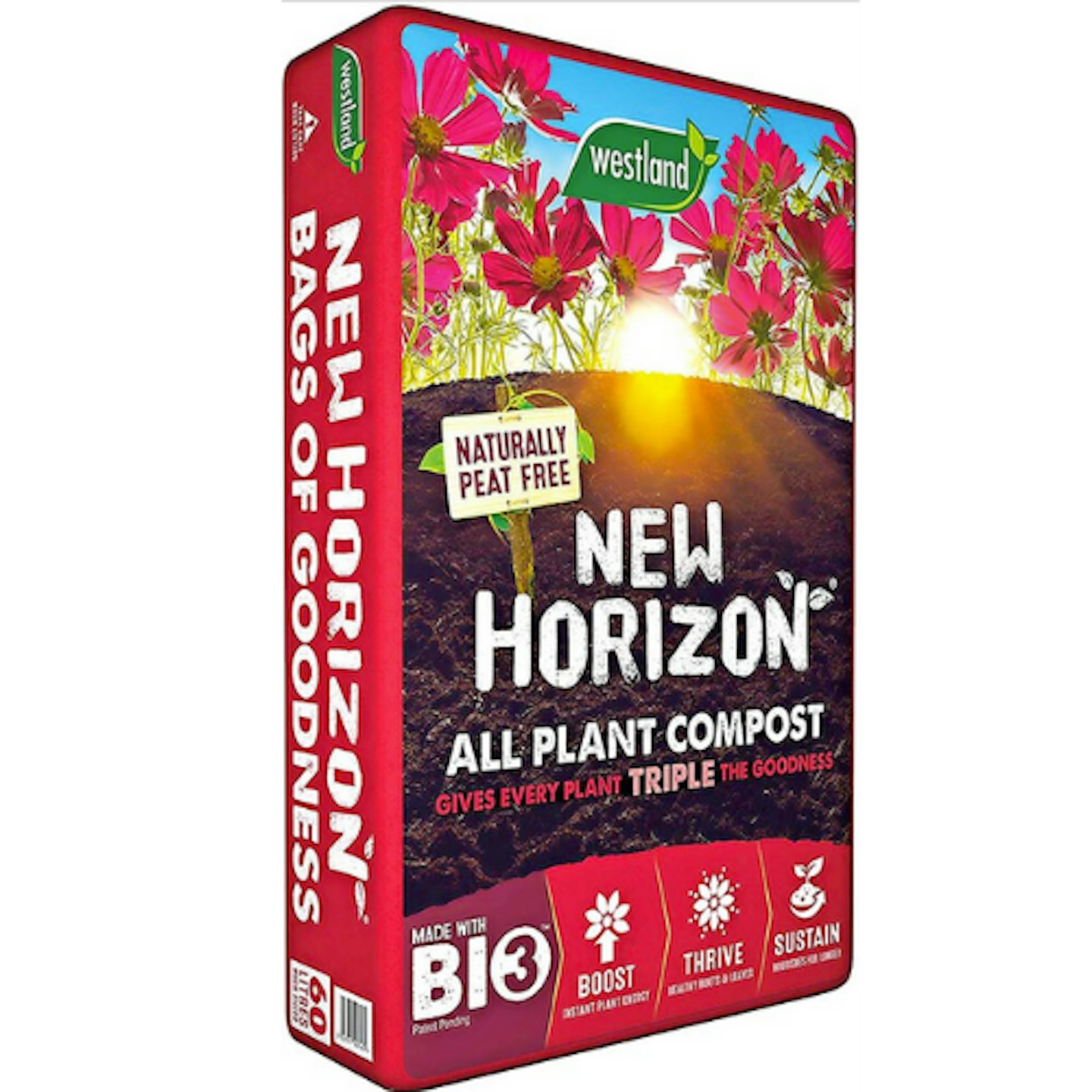
Westland New Horizon All Plant Compost 100% Peat Free contains added BIO3 granules for lots of blooms but has been specially blended for all types of plants. Whether you're growing seeds, fruit, veg, or containers, with a base fertiliser this compost will feed your plant for up to six weeks. This has Westland's West+ magic which creates the optimum structure and air spaces to promote root growth.
Pros
- West+ tech
- BIO3 granules
Cons
- Only works for six weeks
Best for containers
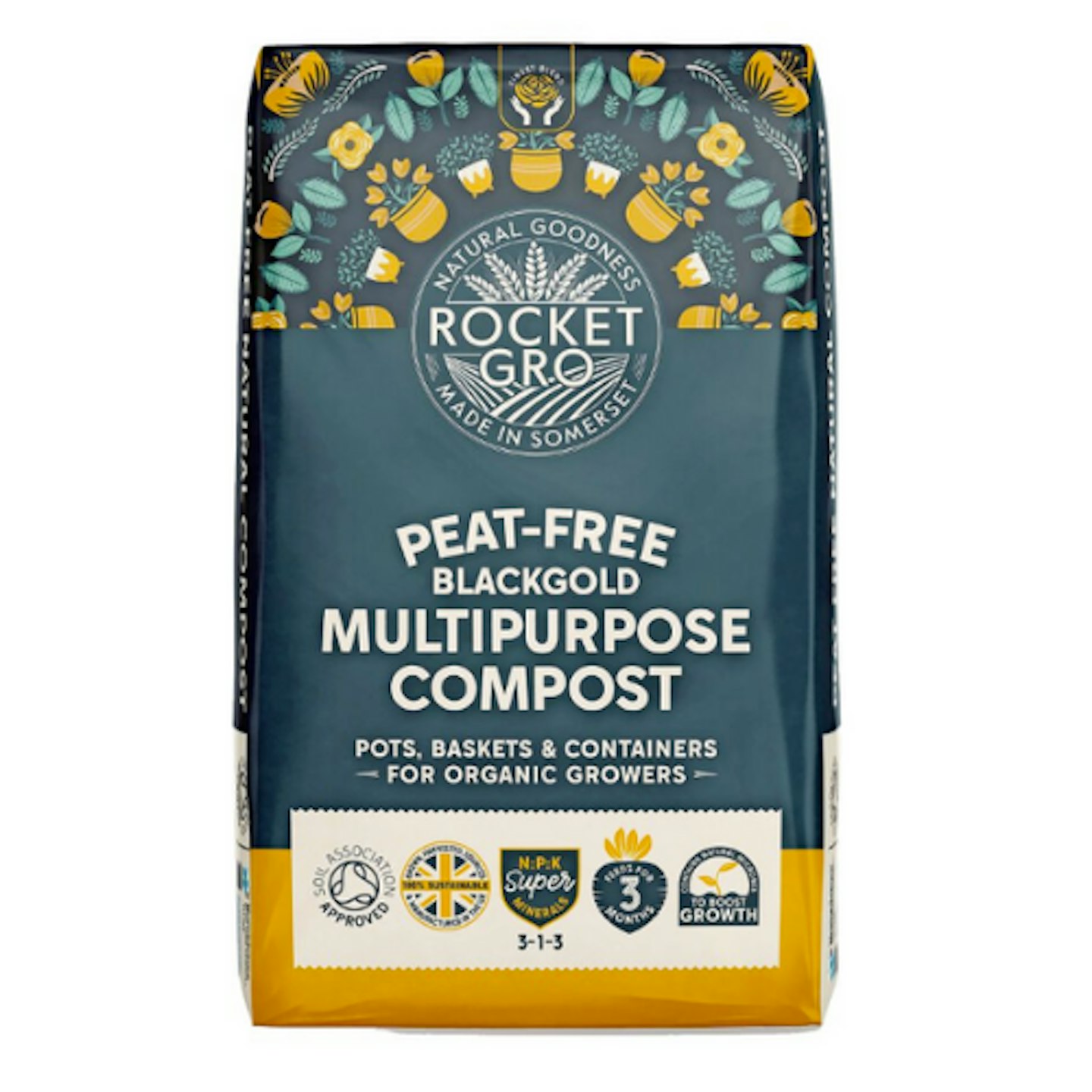 RocketGro/Thompson Morgan
RocketGro/Thompson Morganwww.thompson-morgan.com
RocketGro's BlackGold Multipurpose Compost has a three-month supply of natural plant food that's nutrient-rich and perfect for your pots, containers, window boxes, and everything in between! 100% organic, it has a fine balance of nutrients, water-retaining fibre added, and optimum air pockets for your plant roots. While this isn't ideal for seeds, it is suitable for use in your pots, containers, window boxes, planters, hanging baskets, and even for planting out.
Pros
- Versatile usage
- Soil Association Approved
Cons
- Not suitable for seeds, cuttings or propagation
Best vegan
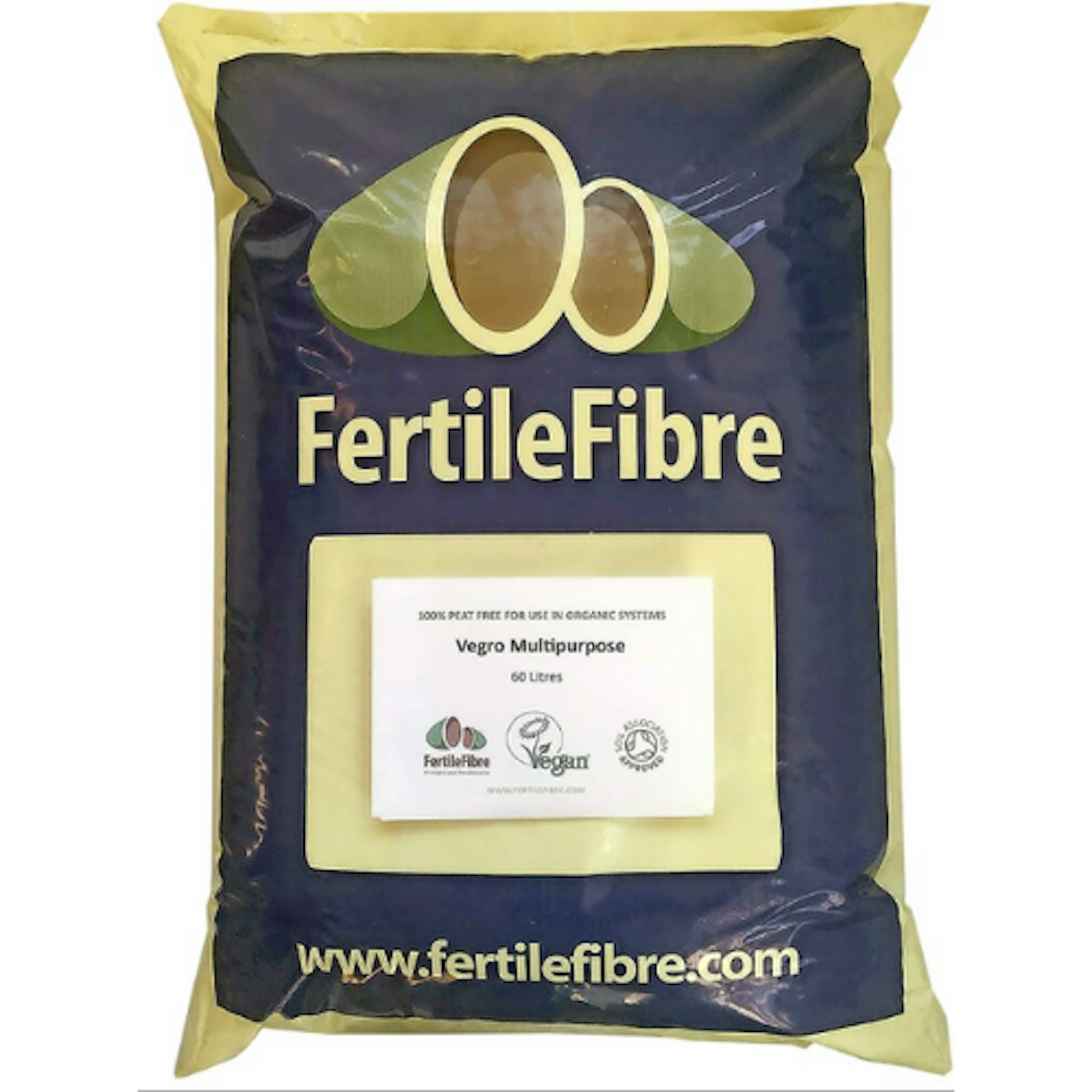 FertielFibre/Amazon
FertielFibre/AmazonVegro Multipurpose is Vegan Society-approved and has all the nutrients needed for a healthy start for your little sprouts. Made from vegetable matter and specially blended to enhance the insulation properties of coir, it's a great choice for water retention, fast root growth, and quick germination. This compost contains slow-release nutrients for strong, even growth over time.
Pros
- Contains organic coir
- Good water retention
Cons
- Can contain weed seeds
Best with grit and loam
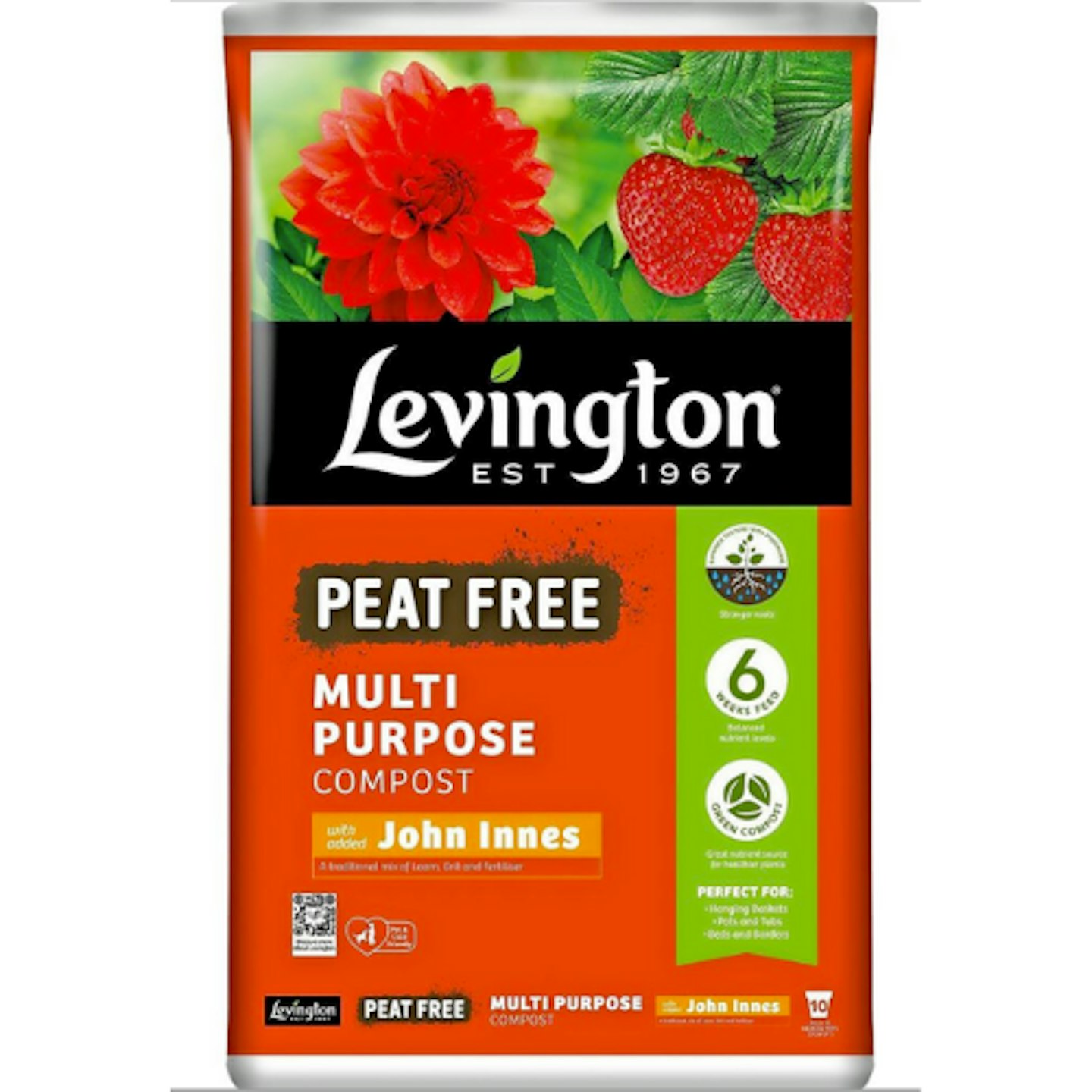 Levington/Wickes
Levington/Wickeswww.wickes.co.uk
Levington Peat Free Multipurpose with John Innes grit and loam encourages more blooms and will feed your plant for up to six weeks. The balanced combination of nutrients includes green compost for added minerals, grit, and phosphate for strong and healthy roots, and can be used for all sorts of planting projects. The loam mixed in is a combination of sand, silt, and clay, so it's ideal for growing all kinds of vegetables.
Pros
- With added John Innes, grit and loam
- Contains green compost
Cons
- Can be wet when opened
Best with potash
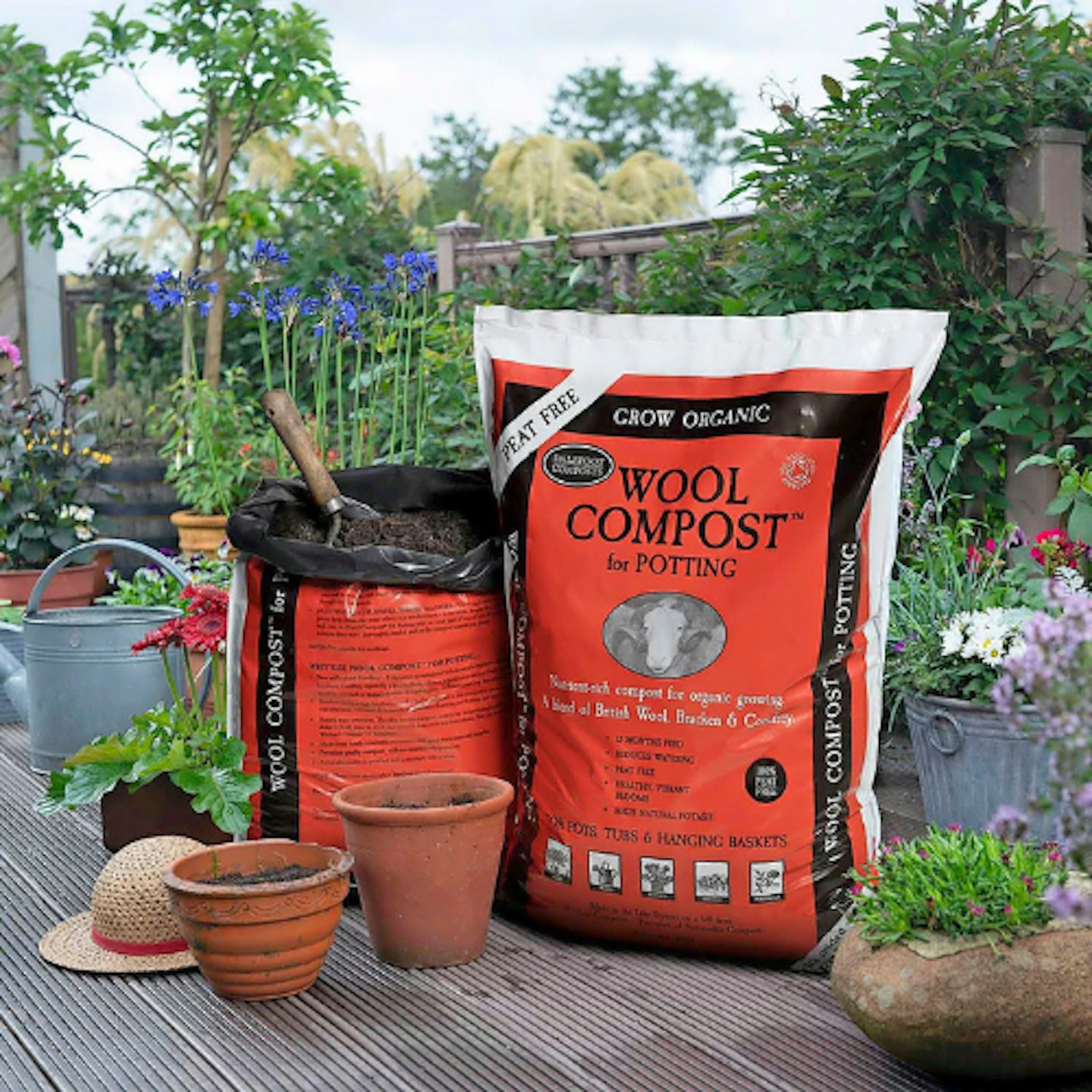 Dalefoot/Marshalls Garden
Dalefoot/Marshalls Gardenmarshallsgarden.com
Dalefoot Wool Compost for Potting is rich in potash, this addition provides added essential minerals, making this a great choice for young and mature plants. Strawberries and other fruit are also fans of potash's alkaline properties. Fertile and strong, the sheep's wool ensures fantastic water retention whilst the slow-release proteins in the wool act as a fertiliser.
Pros
- Wool-based
- Contains comfrey
Cons
- Only comes in 30-litre bags
Best for weed suppression
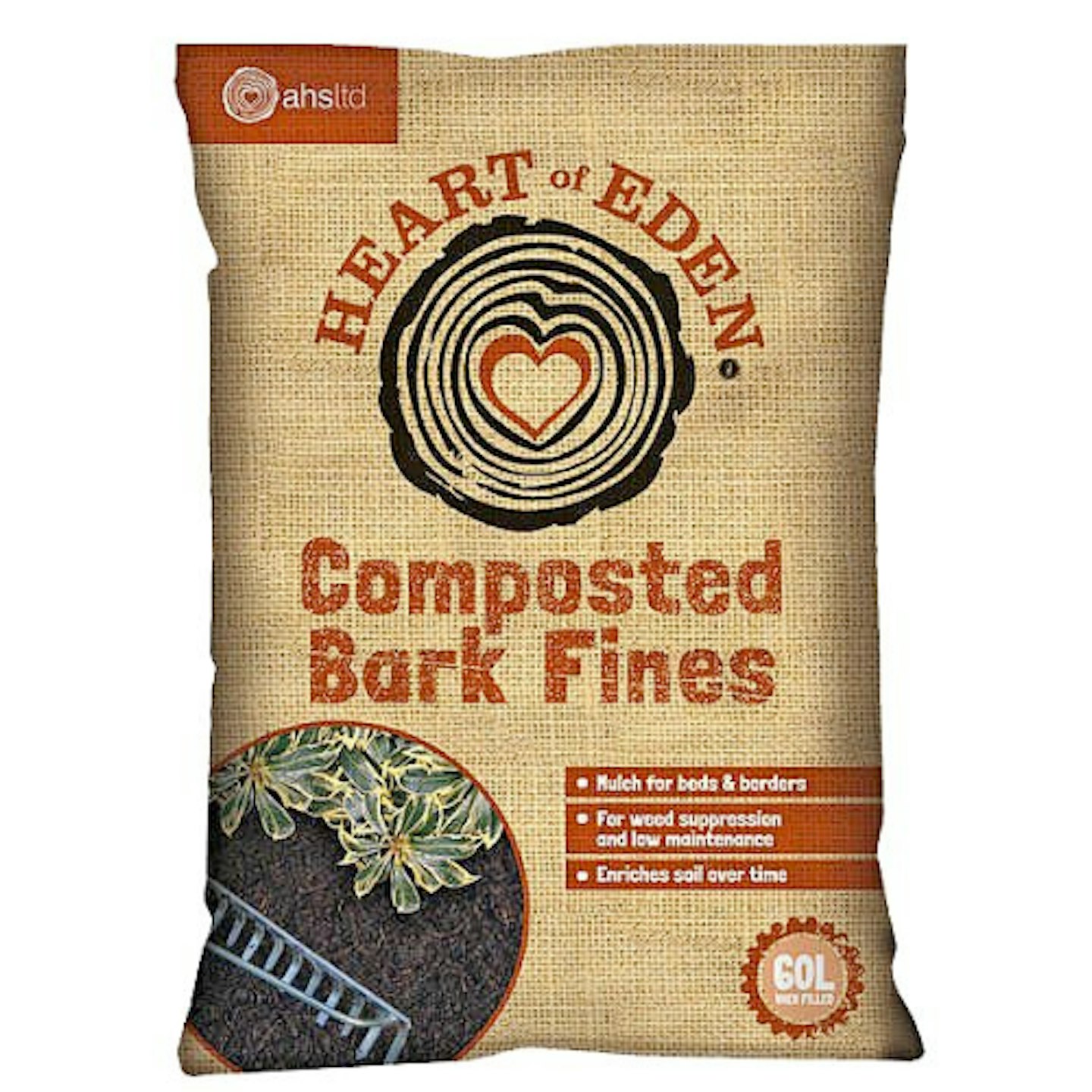 Heart of Eden/eBay
Heart of Eden/eBaywww.ebay.co.uk
Heart Of Eden Fine Composted Bark slowly releases nutrients into the soil. As well as being a great choice for weed suppression. It's durable, low-maintenance, and long-lasting, great for new gardeners or those looking for less hassle. Not only that, but the rich, dark colour makes for an inviting appearance when contrasted with gorgeously vibrant beds of flowers or foliage.
Pros
- Rich dark colour
- Weed suppressing
Cons
- Not suitable for seeds
Best for soil improvement
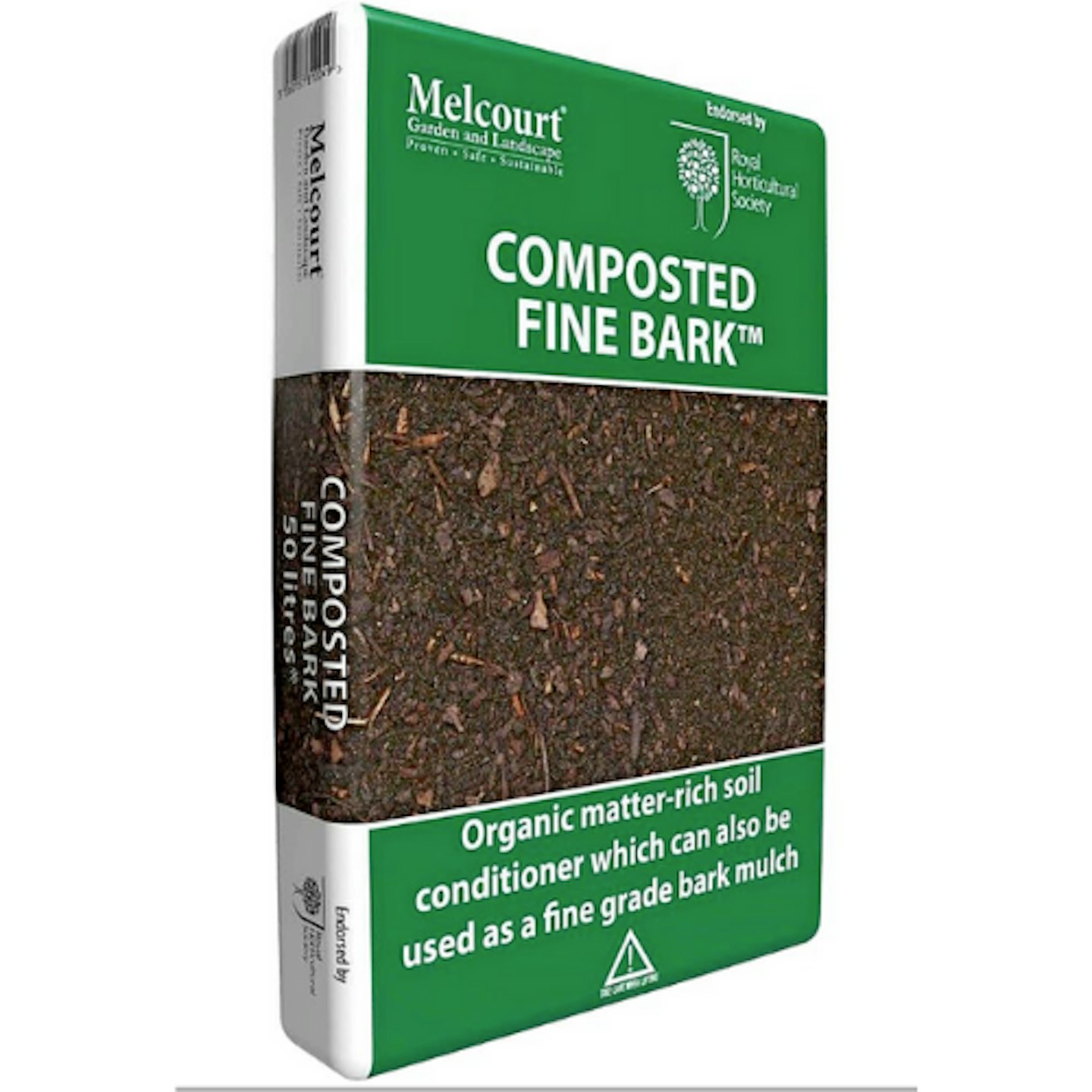 Melcourt/Amazon
Melcourt/AmazonMelcourt Composted Fine Bark is made from ingredients sourced in the UK for a rich, organic, bark-based soil conditioner that's free-flowing. This makes it easy to incorporate this bark-based compost into your existing soil. RHS-endorsed, it's suitable for all sorts of garden projects, helping to improve soil quality and water holding capacity.
Pros
- RHS-endorsed
- Low pH so suitable for acidic soils
Cons
- Best for hedge plants
Best for water retention
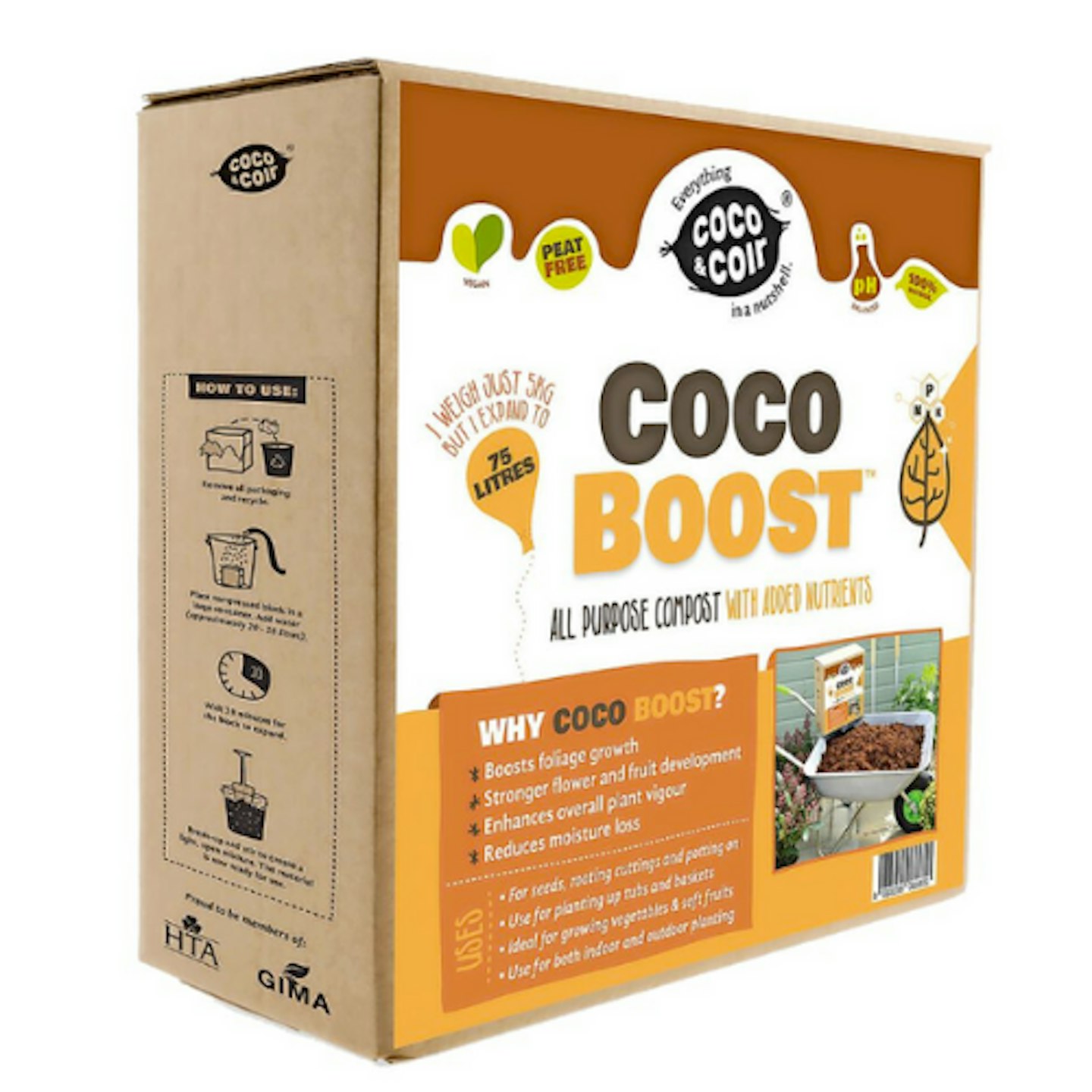
cocoandcoir.com
Coco Boost All Purpose Compost holds onto moisture well and is lightweight and compact to store. With balance-controlled release fertiliser, it can feed plants for up to six months helping to give them healthy foliage, and strong roots, resulting in fantastic flowers and delicious fruits. Added dry, this compost doesn’t start to degrade until you water it, unlike ready-to-use compost.
Pros
- Contains coco coir fibre
- Works for six months
Cons
- Not for use with ericaceous plants
Best for hanging baskets
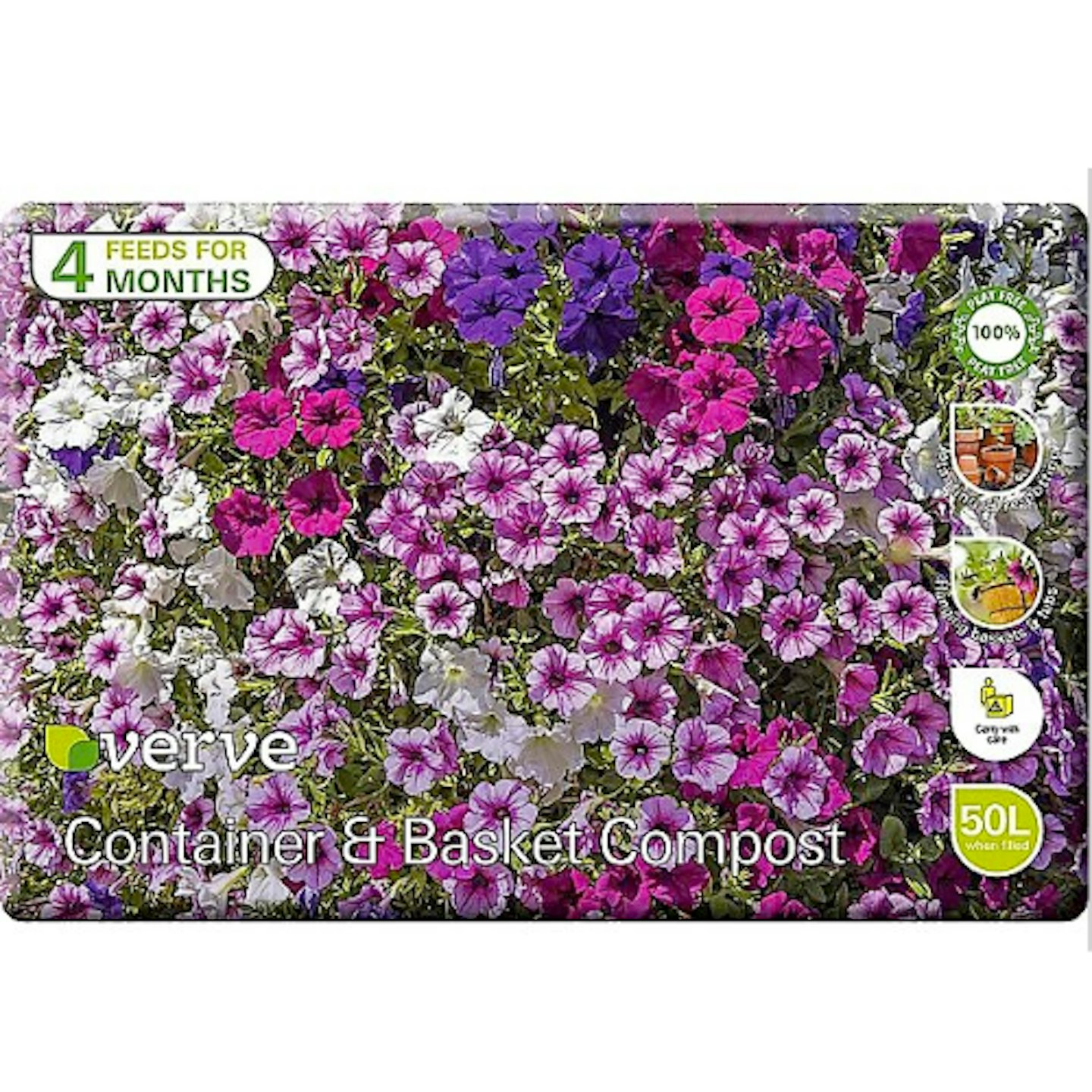 Verve/B&Q Tradepoint
Verve/B&Q Tradepointwww.trade-point.co.uk
Verve Container & Basket Peat-Free Compost has been formulated with a crumbly structure for fast-growing roots in pots, made from 100% coir, wood fibre, biofibre, and loam. It can feed plants for up to four months after planting and can be used all year round, this compost is a fab pick for hanging baskets, containers, and window boxes.
Pros
- Contains biofibre
- Ideal for container growing
Cons
- Can compact in transit
How we chose the best peat-free compost
All of these peat-free composts have been hand-selected by our team of Modern Gardens shopping experts. We carefully considered the composition and best use case in our selection of the best. Our team has spent hours investigating and researching peat-free composts to make it easier for you to find the very best, and we'd never recommend a product we don't believe in.
Where possible, we also test and share the latest and best products you should know about. And with help from Modern Gardens Magazine, Garden News and Garden Answers, we share expert gardening knowledge to help you get the most from your product.
Which composts are peat-free?
Peat-free composts are mostly formulated with industry by-products such as wood fibres, coir, sheep wool and bark, as well as more traditional green waste. These all offer great drainage and a crumbly, air-rich texture, perfect for supporting strong root growth, but the by-product materials tend to lack nutrients.
Manufacturers have made huge strides to counter this, mixing in other materials and adding plant fertilisers, many naturally occurring, to create a blend that’ll offer healthy plant growth. But when it comes to choosing which peat-free product is best for you and your plot, it pays to know what these different compost base materials are good – and not so good – at.
Wood fibre peat-free compost
Wood fibres create a light and fluffy compost and it’s made mainly from waste wood shavings from the timber industry, sawdust, wastepaper and offcuts from planks. Locally available in large quantities, the wood is moistened, pressurised and heated to break the individual fibres apart, making a friable mix that’s perfect for trapping air in between the strands while letting water drain through easily.
It’s low in nutrients, though, and tends to lock in nitrogen, withholding it from plants, so most manufacturers add extra fertilisers into the compost to encourage stronger plant growth. Thanks to its light but bulky nature, wood fibre compost is often mixed with other peat-free compost materials to create a multipurpose medium that’s good for growing flowers, fruit and veg.
Green plant-based peat-free compost
All sorts of plants can be broken down to make compost, from fast-growing bracken to green garden waste and spent hops from the brewing industry. The leafy waste matter usually makes up no more than 30% of the total mix of green compost, with other materials such as sand, coir or finely ground bark added.
The quality can vary, and the bagged compost made from local authority green waste collections often has larger, woodier pieces. There’s also a big difference in the balance of nutrients between brands. But it’s cheap, usually nutrient-rich, widely available and locally made. And there is a British industry standard rating to ensure some consistency and regulation – look out for PAS100 on packaging and you should get a great product.
If you’re striving to garden organically or in line with vegan values, bear in mind that some green-based compost products may have faint traces of chemicals left over from when the waste garden products and clippings were gathered, so look for a tailored product. If you want to ensure a completely chemical-free solution, you can always make your own garden mulch.
Wool-based peat-free compost
Great for thirsty plants, containers and hanging baskets, wool fibre-based composts have high water retention, thanks to all the intermeshing strands that make up the product. This means less time lugging the watering can around the garden for you.
Made from surplus sheep fleece, including the dirtier but organically rich diggings (the stained fleece around a sheep’s rear), this compost is naturally rich in slow-release nitrogen which aids photosynthesis, essential for plant growth.
It has other useful ingredients too including potassium and phosphorous, which are both commonly used in many commercially made fertilisers to encourage speedy plant growth.
Although waste wool can be used as a growing medium on its own, the most widely available product, Dalefoot, is mixed with bracken.
As all these ingredients are locally sourced in the UK, so wool-based compost comes with zero air miles.
Composted bark peat-free compost
With similar qualities to wood fibre-based compost, products made from composted bark are also great for raising seeds and growing on young plants, and for digging into beds to improve soil.
Mostly conifer bark is used, a waste product from sustainable timber production and mainly sourced from the UK.
Finely chipped, milled and screened to remove large chunks, bark-based compost is more acidic than that made from wood fibre so it’s a better choice for acid-loving plants like rhododendrons, blueberries and hydrangeas. It’s better at retaining moisture so it is ideal for pots and raised beds, too.
Coir peat-free compost
The hairy husk of a coconut, coir is a waste product in the coconut-processing industry. The coarse fibre is milled down to make a light, free-draining compost similar in texture to peat. Sold either bagged or in compressed blocks, which you soak in water, coir forms a fluffy, lightweight compost that has plenty of air pockets. These help to insulate roots and retain heat, so strong roots form quickly, resulting in plenty of blooms.
However, coir’s open structure means it’s low in nutrients, so look for products where these have been added, and check to see how long the fertiliser will feed the plants for – usually 4 to 8 weeks. After this period, you’ll need to feed the plants.
Usually imported from Sri Lanka, southern India and sometimes South America, there are environmental costs of transport to consider, and processing coir uses lots of water too. Many companies use carbon-neutral shipping and recycled water, so do check the eco credentials of the brands if this is important to you.
What to read next:
Subscribe to Modern Gardens magazine and get the most out of your outdoor space. Discover everything you need to know to make your outside space look fantastic, quickly and easily, with hundreds of simple ideas, designer tricks, affordable products and expert advice in every issue of Modern Gardens. View our latest subscription offers to save on shop prices.
Jill Morgan writes regularly for Modern Gardens, and loves everything to do with gardens, plants and outdoor living. Her long thin, town garden is the setting for many family and creative projects from bird feeding and veggie growing to den building and mini-pond dipping.

